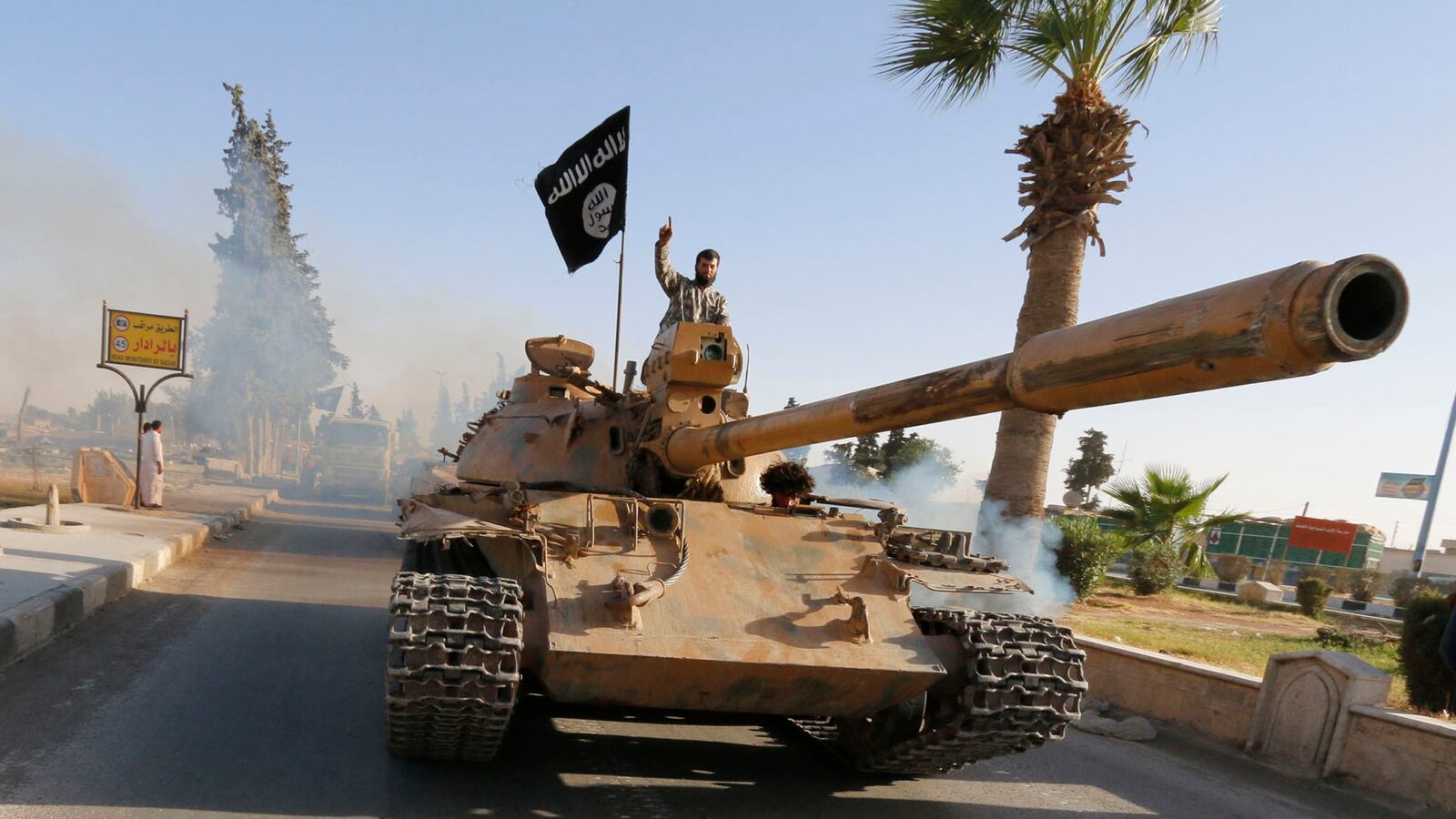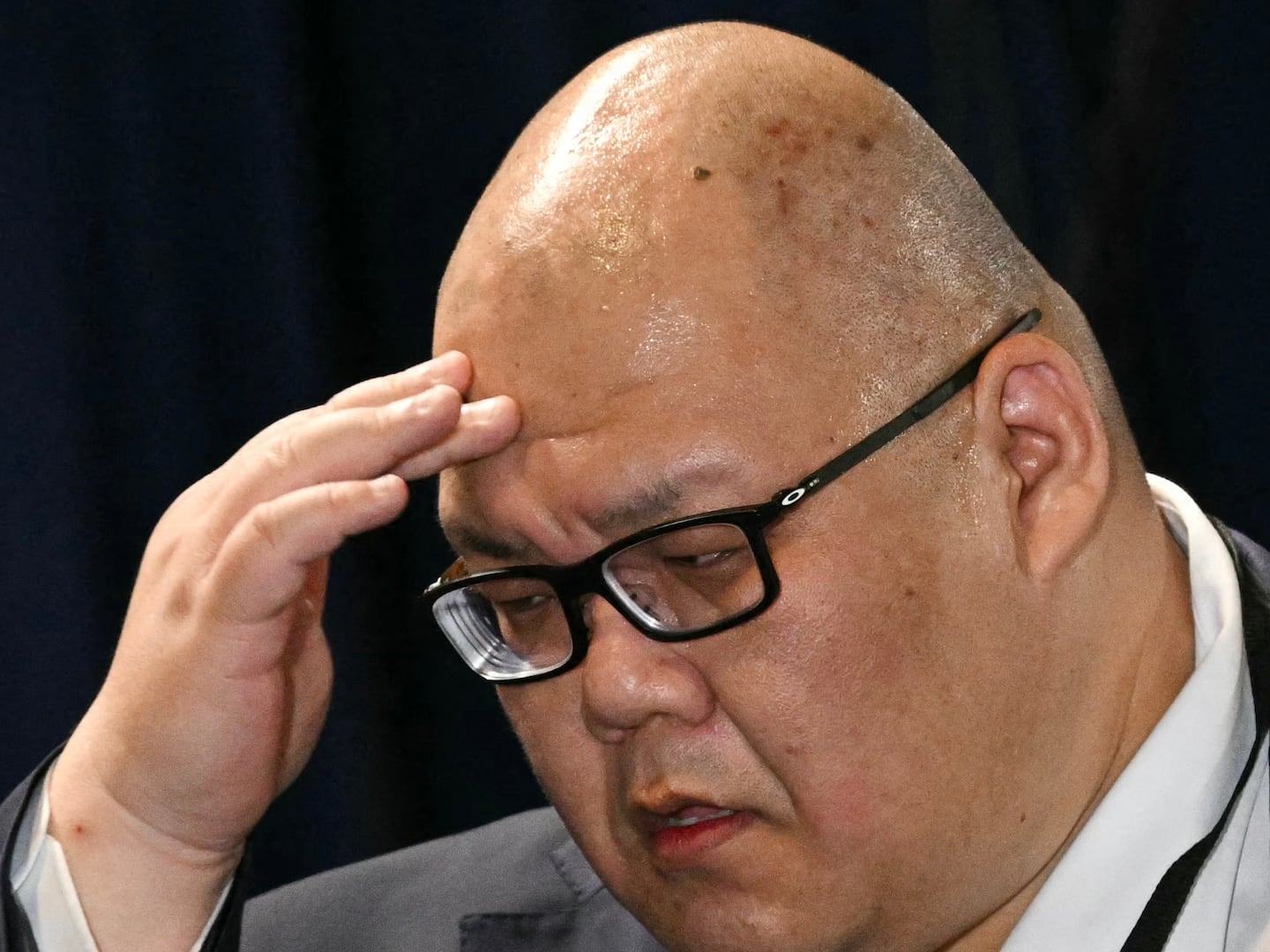The man who calls himself Caliph Ibrahim and demands the allegiance of Muslims everywhere has mastered the manipulation of religious symbols in ways that resonate with gullible young Muslims and scare the hell out of some wiser ones—including many nervous Arab leaders. Abu Bakr al-Baghdadi, as he used to be known, has stopped short of proclaiming himself the Mahdi, a messianic figure who will appear on earth shortly before Judgment Day, but that might just be next.
Ibrahim has captured the imagination of angry young people looking for a different kind of savior: at once an avenging angel, an imposer of order, a restorer of dignity. “What he has done to the global jihad is what 9/11 did,” says a veteran CIA analyst, speaking privately. “Who ever heard of the global jihad on September 10, 2001? And this is on top of that. This takes it to a whole new level, this declaration of the caliphate.”
Ibrahim is not the first Muslim fanatic to exploit the millenarian strains in Islamic theology, whipping up a religious frenzy and gaining a following among the impressionable and the desperate who are eager for the simplicity of, in the words of Egyptian blogger Nervana Mahmoud, an “ideology of glorified backwardness.”
Thirty-five years ago Juhayman al-Otaybi, a preacher and former soldier who advocated a return to the pure, original ways of Islam, shocked the Islamic world by leading insurgents in an attack on the Grand Mosque in Mecca, hoping to oust the House of Saud and establish a pure theocracy. He, too, avoided declaring himself the Mahdi—he assigned that job to his brother-in-law Mohammed Abdullah al-Qahtani—but he played on a wide array of symbols. He launched his Grand Mosque assault on the first day of the year 1400 according to the Islamic calendar, a day Prophet Muhammad is supposed to have said the Mahdi would arrive.
A year before their assault, al-Otaybi and his theology student followers were arrested and charged by Saudi authorities with heresy, but with scholarly arguments they persuaded their accusers they were traditionalists and were released. The Saudi royal family was nervous about confronting revolutionaries, especially those who had convinced Muslim jurists of their orthodoxy. After the siege was broken al-Otaybi was beheaded along with 67 of his followers, but memory of what they did and why haunts the Saudi royal theocracy to this day.
Ibrahim and his supporters are less careful with theology than al-Otaybi, and still more ambitious. A growing chorus of religious scholars is objecting to their declaration of a caliphate straddling Iraq and Syria. Senior jihadi ideologues aligned with al Qaeda have condemned the move on theological grounds.
Abu Muhammad al-Maqdisi, the Jordanian scholar viewed as one of al Qaeda’s top spiritual leaders, has branded Ibrahim’s Islamic State “deviant” and contrary to the principles of Sharia law. While acknowledging that all jihadists yearn for a caliphate that erases the artificial borders of the Arab world and unifies Muslims, al-Maqdisi challenged the basis of al-Baghdadi’s claims. “Is this caliphate going to be a safe haven for all the vulnerable and a shelter for every Muslim? Or will this name become a hanging sword over Muslims who disagree with them?” he asked.
Coming from the Jordanian cleric, that condemnation is especially powerful. He was the religious counselor of Abu Musab al-Zarqawi, al-Baghdadi’s onetime mentor and the vicious Iraqi al-Qaeda leader who not only encouraged beheadings of foes but also wielded the sword himself.
When Osama bin Laden was alive he lined up his religious arguments and big-name clerics to back them. Before announcing his war against Crusaders and Jews in the mid-1990s he took pains to consult Islamic scholars and cited them to justify his actions. Libyan jihadist-turned Islamist Sami Mostefa al-Saadi debated bin Laden twice in Kandahar and told me last year that al Qaeda’s founder embedded his positions in tightly argued Islamic teachings.
Al-Baghdadi appears to be more reckless about that kind of legitimacy and his sermon last Friday in Mosul was short on scholarly citation. His caliphate arguments have attracted so far the backing of only minor clerics. But for him that’s not really a problem.
Al-Baghdadi/Ibrahim’s bully pulpit, or minbar, if you will, is the Internet. The support he gets on social media from around the globe is stunning. Those who “like” him are taunting al Qaeda and the old jihadist guard, says analyst Thomas Hegghammer, director of terrorism research at the Norwegian Defense Research Establishment.
Their attitude about al Qaeda leaders is “Al-Khilafah [the caliphate] does not need them, rather, they need al-khilafah,” he says. Another Twitter jihadist with the handle “Abu Klashnikov” declared, “I dont care for no shaykhs name stop namedropping me these so called big shaykhs.”
Hegghammer suspects that al-Baghdadi’s bravado adds to his appeal for radicalized young Muslims. “Heavy criticism from the ideological establishment may paradoxically bestow an underdog image, which younger recruits may find attractive. What the older generation sees as youthful arrogance, the new generation often sees as legitimate opposition to the established order,” he argues.
This isn’t so much the case of the revolution eating its young but the children of the revolution deciding their parents weren’t revolutionary enough. Mideast scholar Aaron Zelin of the Washington Institute for Near East Policy says, “excitement surged online over the prospect of an Islamic state” following the caliphate announcement on June 27, the first day of the holy month of Ramadan.
The difference in the background of the old guard and the new may go some way to explain why the condemnations of al-Baghdadi by prestigious scholars trotted out by the nervous older generation of jihadists and the equally fearful Arab royal families isn’t blunting the enthusiasm of the young. As Zelin notes in a recent research paper, “bin Laden and his cadre grew up in at least the upper middle class and had a university education, Zarqawi and those closest to him came from poorer, less educated backgrounds.”
That doesn’t hold for al-Baghdadi himself in terms of education—it is claimed he has a theology doctorate from the University of Islamic Sciences in the Baghdad suburb of Adhamiya. But it does for many of the estimated 12,000 foreign fighters who have flocked to the Islamic State and for the wannabes thrilled by the idea of a caliphate.
Blogger Nervana Mahmoud says the House of Saud and other Arab royal families have themselves to blame for the rise of al-Baghdadi. She argues they have flirted with backwardness, using it for unscrupulous political gain, to avoid reform and reject modernity in order to prolong their power.
“Many Muslim youth have started to see radicals as more authentic and genuine,” she argues in a posting for Turkey’s Daily Hurriyet. “The uncompromising posture of the rejectionist stance is a clearer option for many confused youth than models that have failed to weave Western modernity with Islamic teaching.”
Even now some in the Gulf establishments are wondering if they can avoid confronting the children of the revolution. Qatar’s former ambassador to the Washington, Sheikh Nasser bin Hamad al Khalifa, tweeted a warning to the United Sates this week. It should not intervene against the Caliphate, he said, arguing that would be viewed by Sunni Muslims as “an act of war” against them all.






